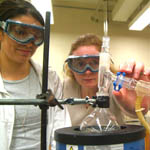Focus 2010 Goal: Prepare graduates for success.
Index
- New academic programs
- Employment rate information
- E-ddress
- Scholarships and student support
- Curricular Incubation Center
New academic programs
New degree programs
The College of Human Development implemented its Bachelor of Science in Golf Enterprise Management in January 2006. Graduates of the program will learn skills in managing golf course properties. Students receive a comprehensive education with courses in business, customer service, food and beverage, retail management, customer development and retention, golf course design and turf management.
The College of Technology, Engineering and Management also received approval to implement a new Bachelor of Science in Information and Communication Technologies, a degree-completion program, in Spring 2007. The degree-completion program was developed in collaboration with Wisconsin Indianhead Technical College to address state, national and global needs for technology professionals. The top 70 high-demand industries in the United States are identified as employing information and communication technology workers, according to the Organization of Economic Cooperation and Development Information Technology Outlook 2004.
New concentration
 The School of Education launched its new certification in science education with an introductory science course in the spring of 2006. The certification program leads to a general science teaching license for approximately grades 5 to 10. The new program will help the state and nation with an increasing shortage of general science teachers, especially at the middle school level. A distinctive feature of the program is its capstone requirement, which will transition future science teachers to teaching professionals.
The School of Education launched its new certification in science education with an introductory science course in the spring of 2006. The certification program leads to a general science teaching license for approximately grades 5 to 10. The new program will help the state and nation with an increasing shortage of general science teachers, especially at the middle school level. A distinctive feature of the program is its capstone requirement, which will transition future science teachers to teaching professionals.
New certificate programs
The Northwest Wisconsin Manufacturing Outreach Center established a certificate program in lean manufacturing. The certificate program will assist manufacturers with the challenge of implementing and maintaining improvements that will impact the bottom line and provide long-term payoff through increased capacity for continuous improvement.
In addition, the School of Education began offering online reading certification courses in Fall 2005. The new courses will help fill a growing need in K-12 schools to provide highly qualified reading teachers as mandated by the federal No Child Left Behind legislation.
Employment rate information
 UW-Stout enjoys an enviable employment record -- 97.9 percent of graduates found work in or related to their major in 2004-05. In 2005, more than 60 percent of new graduates earned annual salaries of more than $30,000—a higher annual income than other UW System graduates.
UW-Stout enjoys an enviable employment record -- 97.9 percent of graduates found work in or related to their major in 2004-05. In 2005, more than 60 percent of new graduates earned annual salaries of more than $30,000—a higher annual income than other UW System graduates.
One of the reasons for a successful employment record is UW-Stout’s applied learning focus. Students receive real-world experience through internships, cooperative education, field experiences, student teaching and practicums.
In fact, the university’s cooperative education program is one of 800 formal, nationally recognized programs. In 2005, a co-op class of 720 students earned more than $5.7 million in wages while earning credit toward their degrees. Job sites were provided by 460 employers.
E-ddress
UW-Stout alumni were offered lifetime e-mail addresses in 2006. Graduates are able to take advantage of this free service to manage their personal e-mail and to stay in touch with former classmates. The e-ddress service can be checked on any computer with access to the World Wide Web. And, through an online directory, graduates are able to look up other alumni e-ddresses based on a person’s first and last names.
Scholarships and student support
 A total of 456 students received 538 scholarships from the Stout University Foundation, amounting to $526,447. UW-Stout students also received more than $49.9 million in student financial aid.
A total of 456 students received 538 scholarships from the Stout University Foundation, amounting to $526,447. UW-Stout students also received more than $49.9 million in student financial aid.
In addition, 1,543 student borrowers will save almost $4.5 million in interest over the life of their student loans because they consolidated them in 2005-06. The Financial Aid Office alerted students to the potential savings and counseled students through the process. In total, the student borrowers consolidated $30.7 million in loans.
Curricular Incubation Center
UW-Stout launched a Curricular Incubation Center to stay abreast with current and emerging needs and to accelerate the development of curriculum in high-priority areas, including:
- Undergraduate and graduate degree programs, minors, specializations, concentrations and certifications that are included in the academic plan.
- Program initiatives with Wisconsin Technical Colleges, such as degree completion programs, online programs and articulation agreements.
- Program clusters, such as two or more programs working together on joint curriculum, student recruitment, marketing and resource sharing.
The center already has funded new programs in bioinformatics, interactive digital environments, polymer engineering, electrical and computer engineering, technology and science education, nanotechnology, cognitive neuroscience, information and communication technologies, and some of the programs that are the foundation of UW-Stout’s NanoSTEM initiative.
Learn more:
- UW-Stout implements Golf Enterprise Management degree
- B.S. degree in Golf Enterprise Management
- B.S. degree in Information and Communication Technologies
- B.S. degree in Applied Science: Science Education
- Northwest Wisconsin Manufacturing Outreach Center
- Online Reading Courses
- Career Services
- Stout lifetime e-ddress FAQ
- Stout University Foundation Scholarships
- Nurturing Curriculum
Published for the Chancellor's Office by the Office of University Communications
with assistance from the Office of Budget, Planning and Analysis.
